- Home
- Kevin Ashman
Medieval IV - Ring of Steel Page 13
Medieval IV - Ring of Steel Read online
Page 13
‘Gentlemen, therein lay the plans. I will not demean your intelligence by outlining the detail of each campaign for that is your job. Suffice to say, the path to victory lays in finding their leaders. Remove the head from the beast and the body will fall. Be gone, my lords and let fortune guide your way.’
Every man acknowledged the king and bowed their heads slightly as he left the room, leaving them to study the map in their own time.
‘Fermbaud,’ said the king as he left, ‘attend me.’
Nicholas Fermbaud followed Edward and walked alongside him as he received his instructions.
‘You will pass word to my command,’ said Longshanks, ‘we ride out at dawn. Tell them they have this night to prepare and expect a hard ride, I want to be in Rhuddlan as soon as possible. When I have gone, you will ride to Chester to meet Orland and the men from the north. When they arrive, march them west with all haste and muster at Flint Castle, there to await my further orders.’
‘Aye, Majesty,’ said Fermbaud, ‘is there anything else.’
‘Yes,’ said Longshanks, stopping and turning to face him. ‘This forthcoming campaign will demand courage from every man in the field, whether pike man or knight. I expect you to step up to the mark and display a mettle deserving of your title. Whispers abound in the passages of the court belittling your last foray against the Welsh and many would have me remove you from this campaign and send you back to manage the treasuries. However, I see more in you than that, Fermbaud and feel it is no fault of your own that I have allowed you to grow fat within the castle of Bristol. You were knighted for a reason and over the next few weeks, I expect to be reminded of that reason on a daily basis. Do I make myself clear?’
‘You do, Sire.’
‘Good, this is another chance to redeem yourself, Fermbaud, don’t waste it.’
Without another word he strode down the passageway and into a side room, slamming the door behind him.
----
The next day saw over three thousand armed men muster on the fields outside the castle as Edward’s column prepared for the march. The frosty morning air stung the lungs of the soldiers and the fields resounded with the sounds of the sergeants checking their men. Impatient horses, excited at the activity pawed at the ground, their breath forming small clouds of steam about their heads and servants ran in every direction, carrying out the whims of their masters. Soldiers took the opportunity to kiss goodbye to those loved ones who had followed the column thus far but now they were actually going into battle, they knew Edward would contemplate no followers about his army, whether family or otherwise. He needed the men to be focussed on one thing and one thing only, the campaign. Other men sat on their packs, waiting in silence for the march to begin while others played dice with their comrades, laughing or cursing depending on their luck. In an adjacent field the supply wagons were going through the final checks, sacks of grain were rammed tightly into every available space and barrels of ale fastened securely against the sides of the carts. Butchers wagons were piled high with salted meat and barrels of dried fish, while sacks of hard biscuit and dried fruit filled other wagons, the staple diet of the main army should fresh supplies be difficult to come by.
Further carts carried tens of thousands of bolts for the crossbows and there were even several dismantled Mangonels amongst the stores, available for relatively quick assembly should the need arise. Spare swords and knives were few for it was expected that should they engage the enemy and be victorious then the availability of side weapons would not be a problem, they would just take them from the dead. Similarly, every hundred archers had a young boy assigned to their unit tasked with collecting what arrows they could when any battle was over.
Every man carried a blanket and enough dried food for one week in his pack and wore whatever clothing they could afford. The lucky ones had gambesons, the quilted jackets that were fairly effective against glancing blows or an arrow at the end of its range while the older heads even went as far as to have thin steel plate stitched to the protective jackets for although it made them heavier to carry, the extra protection they afforded may just save the wearer’s life. By far the most important piece of clothing for each man were their capes, long garments of waxed leather, essential not only against the notoriously wet Welsh weather but also as waterproof shelters when they camped between towns. Some units had communal tents and as many men as possible would squash inside but those new to campaign only had their capes to fall back on.
Already, heavily armed patrols had been sent onward to those castles still in English hands to warn them the king was on campaign and they would be expected to offer him and his command whatever resources necessary to maintain the offensive, whether it be shelter, supplies or manpower.
----
Although the sight of so many men at arms was impressive, it was nothing compared to the full strength that waited to join them as they campaigned across the border. Another two thousand would join them in Wrexham and combined with the infantry from the north and Reginald De-Grey’s garrison at Rhuddlan, Longshanks would be leading an English column almost ten thousand strong. His cousin Edmund would soon join up with Henry De-Lacey in the west making a second column of over three thousand while the Earls of Warwick and Gloucester added another ten thousand each. Combined with the supply wagons and the sailors of the fleet, it meant that Edward commanded an army of over thirty five thousand men, a force never heard of before in any of the Welsh uprisings across the years.
The constant shouting and endless noise generated by the waiting column fell silent as a horn echoed out across the fields and people turned to see the gates of Worcester Castle swing slowly open. For a few moments, nothing happened but to a fanfare blasted from the castle walls, Edward rode out resplendent in his full ceremonial armour. Behind him came two standard bearers flying the flag of the king’s house and behind them came fifty fully armoured knights, each resplendent in the colours of Edward.
Soldiers and civilians alike threw themselves back off the road as the riders galloped past, the horses’ hooves throwing up the mud as the people cheered their king. Edward rode to the head of the column a full half a mile away and as he approached, the sergeants made the men stand either side in regular ranks, tribute to the fact their monarch was amongst them.
‘Marshall,’ he called, reigning in his horse, ‘are we ready to move?’
‘We are, Sire’, replied the officer, ‘and only await only your command.’
‘Then as soon as my knights have passed, set the men about the march. The day is young, Marshal and I want to see at least ten leagues behind us before we set up camp. At that speed we can be in Wrexham within three days.’
‘Aye, Sire’, shouted the Marshal and as the king galloped away he turned to his command.
‘Men of England,’ he roared, column of three, ‘prepare to march.’
The men ran forward and arranged themselves into the common marching formation, adjusting their kit as they did so. Those who had heard the king giving his orders passed the word down the lines and soon the army was ready for the march.
As the last of the knights galloped past, the Marshal roared out his order.
‘By royal command, men at arms, advance.’
Like an enormous uncoiling snake, the army started to move along the road, the ground beneath them already a muddy bog from those in front. The fight back had begun, Edward the First of England was heading back into Wales and this time, he was going to stay.
----
Chapter Twelve
Brycheniog
Gerald of Essex rode into the town with ten mounted lancers and fifty infantry. The sound of their passing did not go unnoticed but though many eyes peered from between closed shutters, everyone knew that for a patrol to be out in the hours of darkness, there must be something wrong and when that was the case, it was essential to keep as low a profile as possible. As they reached the town square, Gerald dismounted and walked into the tavern, closely followed by
a dozen of his men at arms.
Instantly the noise fell away as the people inside stopped talking and turned to see what the stranger wanted. Gerald looked around and slowly drew his knife, causing murmurs of consternation throughout the tavern.
‘Can I help you Sir?’ said a portly man, coming forward to greet the knight.
‘Who are you?’ asked Gerald.
‘I am the innkeeper, Sir and I run a good house. No whores or Bawd’s here, my lord, it is a good business and I pay my taxes on time.’
‘I doubt that,’ said Gerald with a sneer, ‘bring me ale and quick about it.’
‘Of course, Sir,’ said the man and waved over at the servant near the barrel. ‘Ale for our Lord and make sure the tankard is clean.’
Gerald walked over to the nearest board, the trestle table common to such places and looked down at the two men staring intensely at their leather jacks of ale.
‘You,’ said Gerald, placing the blade of his knife under the man’s chin, ‘look at me.’
The man looked up at the knight and though there was a knife against his throat, his eyes held barely concealed contempt.
‘What is your name?’ asked Gerald.
‘Tom of Brecon, Sir,’ said the young man.
‘And what is your trade?’
‘Farm labourer, Sir.’
‘There is a fire in your eyes, Tom of Brecon, do you know who I am?’
‘You are the castellan, Sir, lord of this manor and Constable of Brycheniog.’
‘I am,’ said Gerald, ‘so tell me, you seem to have a goodly amount of friends here, can I assume that you are a popular man?’
‘I don’t know about that, Sir, I am just enjoying an ale after a hard day at the plough.’
The innkeeper appeared and handed Gerald a wooden tankard, filled with frothing beer. Gerald sniffed at it before taking a sip and swilling it around his mouth.
‘I’ve tasted worse,’ he said and took a deep drink before throwing the tankard into a corner.
‘Let me put it another way,’ said Gerald, returning his attention to the farm labourer, ‘I assume a young man as popular as you will know most of the people in Brycheniog?’
‘I know a fair share,’ said Tom.
‘I thought so,’ said Gerald, ‘in that case you won’t mind telling me where I can find the house of the fletcher. ‘
Tom’s eyes darted toward the others in the room but they had all found interest in different directions, none keen to get involved with the situation.
‘I don’t know of such a man,’ said Tom.
Gerald leaned over and whispered quietly.
‘Wrong answer,’ he said quietly and without warning, swung his knife downward to cut off the man’s ear.
Tom screamed and tried to rise but Gerald grabbed the back of his head and smashed it down against the board, knocking over the containers of ale. All around the room men rose from their benches but fell silent as the soldiers drew their swords. Gerald’s voice resounded off the tavern walls.
‘Silence,’ he roared and as the noise fell away, he leaned forward and spoke into his victim’s other ear.
‘Right,’ said Gerald, ‘let’s start again but this time I want you to consider two things. Firstly, I am not known as a man of patience but I suspect you know that already. Secondly, I don’t know if labourers can count but just in case you can’t, let me inform you, there is only one ear currently attached to your head. Now, it would be a great shame to lose that one as well but in case there is any doubt, just be aware that I will ask this question one more time only. After that, my questioning will be pointless as you won’t be able to hear me. Do you understand what I am saying?’
‘Yes Sir,’ gasped Tom, his eyes watching the blood from his wound mingling with the spilled ale.
‘Good, then let’s start again. Where can I find the house of the fletcher?’
‘Sir,’ said Tom, ‘I beg mercy for I truly do not know.’
Gerald grimaced in disappointment but as he moved the knife to sever the other ear, a voice called out across the room.
‘Sir Gerald, hold your arm. The boy speaks truly for it is unlikely he knows of the house which you speak.’
Gerald turned his head slowly and stared at the man on his feet.
‘And who are you, may I ask?’
‘My name is Father Michael and I am the priest of this village.’
‘Ah, a holy man,’ said Gerald. ‘Why does that not fill me with confidence?’
‘I speak the truth, Sire, I know this boy and his family. They farm one of your Burgages not two leagues from here and rarely venture into the town.’
Gerald released his victim and walked toward the priest. Behind him two of the serving girls ran to help the young man, taking him into the only other room in the building.
‘So, priest,’ said Gerald, ‘am I to understand that you know the whereabouts of this dwelling?’
‘I do, Sire but am concerned on their behalf for it is obvious your need to find the family upsets your temper.’
‘A very astute observation,’ said Gerald, ‘however, that is no business of yours. Now, furnish me with directions and I will be on my way.’
‘The directions are difficult to explain, Sire for the streets are many and they hold no signage as to their names. It would be better if I took you there myself.’
‘Agreed,’ said Gerald and pointed toward the man’s tankard. ‘Finish your ale, priest for I am a fair man and would not separate a holy man from his beer. Be quick and then join me outside.’
As the soldiers left, the tavern broke into activity, many angry about the treatment of the labourer.
‘Who does he think he is?’ hissed a voice, ‘surely he is not above the law. Tom is disfigured for life.’
‘You know as well as I,’ said the priest, ‘Essex is the law around here and answers to no man except the king. He could have us all hung as brigands and not a brow would be raised in question.’
‘Why did you agree to help him?’
‘I had no other option. If I hadn’t intervened then Tom would now be minus both ears. I have bought Fletcher some time but someone needs to warn him. Who here knows his house?’
‘Most of us,’ said a voice, ‘but we will never outrun those horses.’
I know a shortcut, Sir,’ said a voice and Father Michael turned to face the young boy who had spoken, ‘and if I go by way of Dead-Sheep Stream, I can be there before you.’
‘Good idea,’ said the priest, ‘go now and tell the Fletcher to leave immediately. They have no time to pack anything, just get out and into the forest. I will delay them as much as possible.’
‘Yes Sir,’ said the boy and ran out of the rear door.
The priest turned to the rest of the men in the tavern.
‘The rest of you, wait until we have gone and then I suggest you return to your families and think about your safety. The constable seems in a foul mood and you can wager that when he finds the fletcher missing, he will unleash his anger against the first poor soul who crosses his path.’
‘What about Tom?’ asked the innkeeper.
‘Take him to the church and summon the apothecary. The wound needs to be cleaned and seared before infection takes hold.’
After the priest had left and the sound of the horses’ hooves on the cobbles had died away, the talk in the tavern turned to the ongoing oppression by the English and the up-swell of resistance in the north. Finally one man stood and banged his tankard on the table. The men fell silent and looked toward him in anticipation. Edwyn was a farmer who tilled the soil on behalf of Gerald’s estate and though he was a man of few words, when he spoke, people listened. His huge frame seemed to dominate the room and the large leather jerkin trimmed with an enormous ruff of sheepskin added to his striking appearance.
‘Enough,’ he called, looking around the room, ‘you speak like washer women with the latest gossip. All around me I hear boasts of what each of you want to do to the castellan yet
when the opportunity lay before you, not one man raise his voice in anger. Poor Tom suffered a grievous injury through no fault of his own and though we all knew it was unjust, what did we do about it? Nothing. Not a sword, not a knife, not a fist, not a word. We sat back and averted our eyes. Is this what we have become, sheep to the wolves that live behind their walls of stone? I remember sitting at my father’s knee and hearing the stories about how the men from these parts fought alongside the Welsh kings from the days of Hywel Dda right up to our own Llewellyn Ap Gruffydd, not ten years since. Brycheniog men have always been known across Wales and beyond as men of honour, brutal in battle, yet magnanimous in victory.’ He looked around again. ‘Where are those men he spoke of? Those heroes of Welsh descent who would rather die than bend a knee to a tyrant for I see none before me, despite their ale fuelled empty words.’
‘You too were silent, Edwyn,’ said the Innkeeper.
‘Aye, that I was,’ said Edwyn, ‘and the shame lies upon me like the heaviest cloak. But I am no longer going to turn the other way as that tyrant places unreasonable tallies upon my farm. Every day I work harder yet every day we eat less, taxed to starvation by men who gather wealth like we gather hay.’
‘We have always served a lord,’ said another, ‘it is the way it has always been.’
‘Granted, but at least in the days of Cadwallader there was a fairness about the system. Yes, there were taxes and in all honesty the family probably grew rich off our backs but at least they never pushed us to the point of starvation. Although there was poverty, everyman could spare a crust for his neighbour and the lash was a sight unseen. Well, enough is enough and I for one will bear it no longer. Our brothers across Wales are making a stand and I say we join them, stand up to avarice and cruelty and once more make this town the honourable place it once was.’
‘We cannot take on the entire English army, Edwyn.’
‘Perhaps not, but do not giant oaks from small acorns grow? All we need to do is to look after our own corner and should every town do that, these flames of revolution can become a raging fire.’

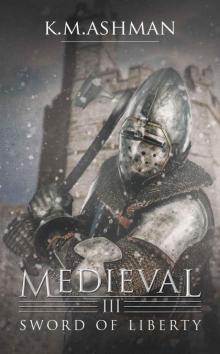 Medieval III - Sword of Liberty
Medieval III - Sword of Liberty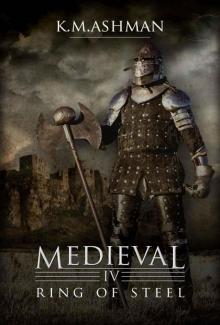 Medieval IV - Ring of Steel
Medieval IV - Ring of Steel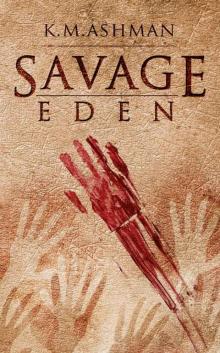 Savage Eden
Savage Eden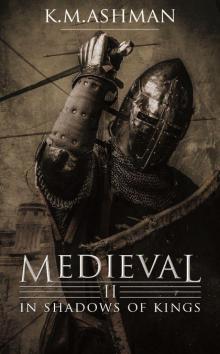 Medieval II - In Shadows of Kings
Medieval II - In Shadows of Kings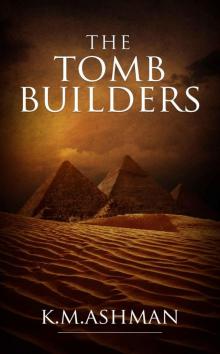 The Tomb Builders
The Tomb Builders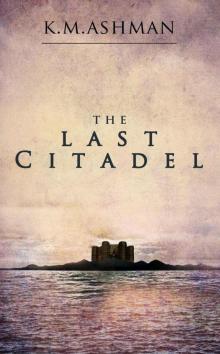 The Last Citadel
The Last Citadel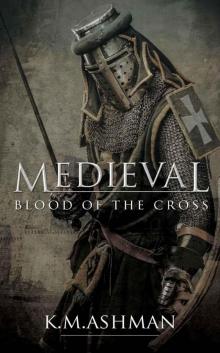 Medieval - Blood of the Cross
Medieval - Blood of the Cross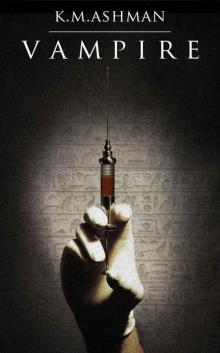 Vampire
Vampire Roman
Roman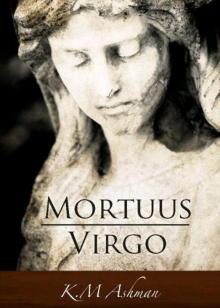 Mortuus Virgo
Mortuus Virgo